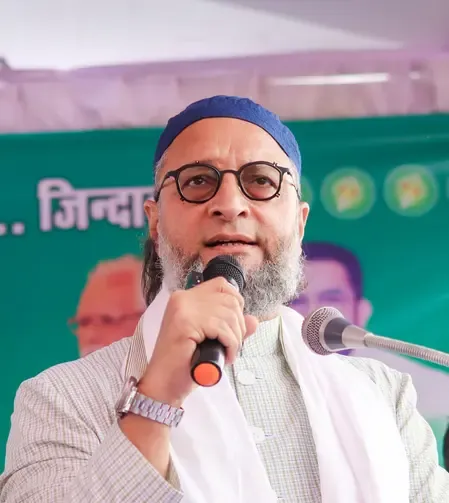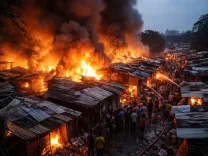Is It Ignorance to Assume We Don’t Work for Hindus? Owaisi Responds to SP’s Afzal Ansari

Synopsis
Key Takeaways
- Inclusivity is a core principle of Owaisi's party, despite misconceptions.
- Owaisi's engagement with all communities reflects a broader political strategy.
- Political challenges are often rooted in misunderstandings of party dynamics.
- Regional issues like underdevelopment are central to Owaisi's campaigning.
- Labels in politics can often reflect deeper societal biases.
New Delhi, Nov 9 (NationPress) The Chief of All India Majlis-e-Ittehadul Muslimeen (AIMIM), Asaduddin Owaisi, responded sharply to Samajwadi Party MP Afzal Ansari, who suggested that Owaisi should contest elections in a constituency with a Muslim minority. Owaisi stated that such remarks reveal a lack of understanding regarding his party's operations and its commitment to inclusivity.
In an interview with IANS, Owaisi remarked, “What do they know about how we operate in Hyderabad? They mistakenly believe that we don’t cater to Hindus; that’s their lack of awareness. He fails to recognize that our party includes MLAs who started out delivering newspapers; he has never visited my office, where I welcome everyone five days a week. Half of my visitors are our Hindu brothers and sisters, primarily from the Dalit community.”
He further added, “He overlooks this fact. He departed from the Communist Party to establish Ekta Dal, then allied with Behenji (Mayawati), and subsequently with Akhilesh. Now, he is discussing family ties. He should understand that if one examines the Constitution of India, there exists a fundamental right, the Right to Equality, which emphasizes substantive equality, and we strive to realize that equality.”
Previously, Afzal Ansari, the sibling of the deceased gangster-turned-politician Mukhtar Ansari, questioned Owaisi's political strength by challenging him to run from a constituency where Muslims are a minority. “Will Owaisi contest from a locale where Muslims comprise a mere nine percent? I have served as an MLA five times and an MP three times. Owaisi has as many MLAs nationwide as there are in my family,” he claimed.
Owaisi, who has been actively campaigning throughout Bihar’s Seemanchal region, also addressed concerns surrounding underdevelopment, discrimination, and the region’s neglect.
He criticized opposing parties for branding Seemanchal residents as “infiltrators” and underscored the failure of the education and healthcare systems.
Additionally, Owaisi condemned RJD leader Tejashwi Yadav for labeling him an extremist, stating, “His remarks clearly indicate that his heart is filled with hatred, causing him to perceive individuals with beards and caps as extremists. The public is observing him.”










